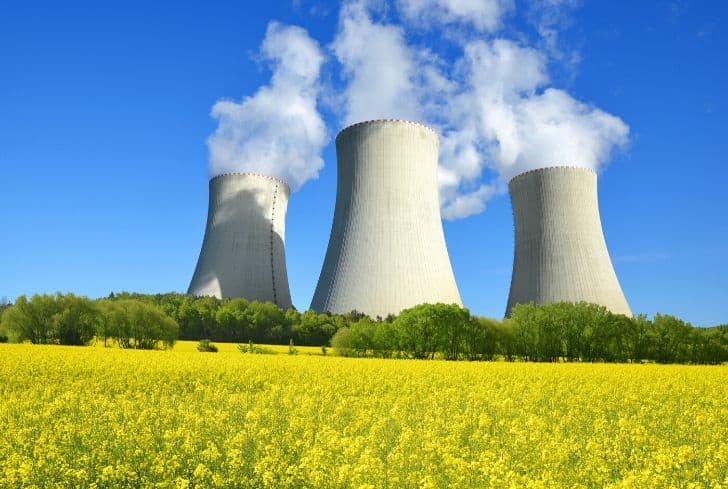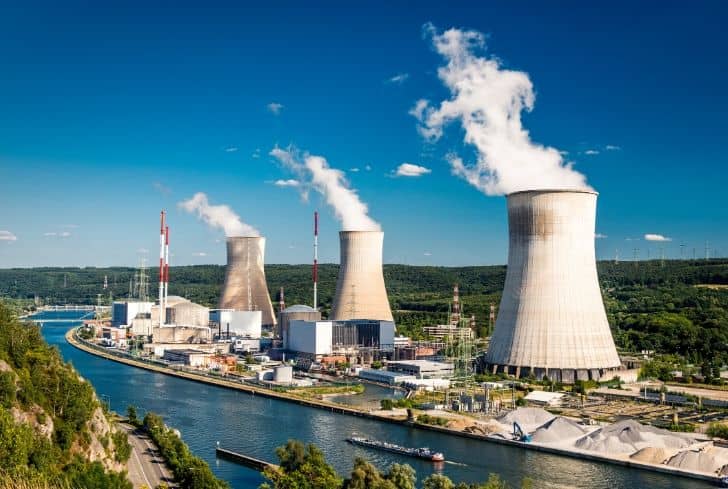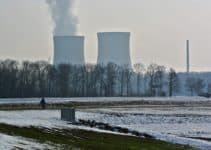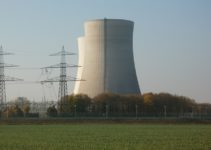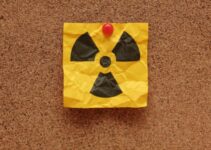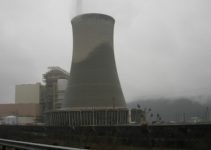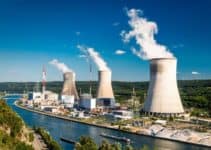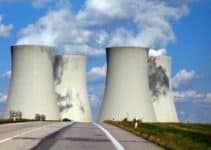Nuclear energy is the energy that is in the core (nucleus) of an atom. Atoms are small particles that make up the entire universe and everything it holds. There is a tremendous force of energy that is able to keep the atoms bonded together. What is amazing about nuclear energy is that it can be used to make electricity. In order for the energy to be “released” (i.e., produce electricity) one of two things must occur, either nuclear fusion or nuclear fission.
In the process of nuclear fusion, the energy is able to be released when all of the atoms combine together to form a very large atom. The sun is able to produce energy this way. In nuclear fission, atoms separate and split apart from all of the other atoms to create a much smaller atom, and then releasing the energy. This is how nuclear power plants produce electricity.
If we are to meet the growing electricity demand in the United States without significantly increasing emissions of greenhouse gases, we must maintain a diverse supply of electricity, and nuclear power must be part of that mix.
~ Judy Biggert
Nuclear power has been used as a source of energy since the 1950s. Over the years, the source of energy has grown and there are about 440 nuclear power reactors in the world, accounting for about 10% of the planet’s electricity. Nuclear energy is the energy contained within the core or nucleus of an atom. When these atoms split during nuclear fission, they release energy. The energy released can power homes, industries, schools, hospitals and much more. Despite this, nuclear energy has been subject to a lot of controversies and it will be discussed in length below.
Is Nuclear Energy Renewable?
The answer to this both yes and no! This is because although the energy itself, produced by the nuclear power plants is renewable, the fuel used and required, is not. Uranium is the preferred fuel for nuclear fission in nuclear power plants. However, only one certain type of uranium (U-235) is suitable for the process. Uranium is a very common metal in the world, but the required isotope is comparatively rare to find, making it a non-renewable fuel for the renewable energy it produces.
The steam produced by the plant and used to power the turbines and the generators is recycled, making the source of energy all the more renewable. The steam is cooled down in a cooling tower and turned back into the water, which can be used again in the nuclear fission process.
Nuclear fission involves splitting the large atomic nucleus of the uranium 235 into smaller nuclei, producing energy. Also being investigated in length is nuclear fusion, which involves the combining of two or more atomic nuclei to form one or more different atomic nuclei and subatomic particles, like neutrons and protons. These processes produce renewable energy, although the materials are not easily available.
Is Nuclear Energy Sustainable?
Overwhelmingly, nuclear energy is sustainable. Through the production of nuclear energy, the process produces clean energy and does not result in environmental pollution or the release of greenhouse gases. This makes the energy more sustainable for the environment than fossil fuels.
The only by-product of the process is excess steam, which can simply be recycled into the atmosphere as clean water vapour. The biggest challenge which makes nuclear energy unsustainable at this particular minute is the fact that the uranium required is not readily available and even if it is, there is a human timescale on when it will be used up entirely
If the source of the uranium is changed, or if the science allows for nuclear fusion, we will be able to have a sustainable source of the raw material, thereby making the source of energy more sustainable. Spring Power and Gas estimates that the remaining amounts of uranium in the world can serve us for the next 80 years, making nuclear energy sustainable and available to some generations to come. If we can turn nuclear fusion into a reality, the source of energy would be sustainable and able to sustain us for the foreseeable future.
Is Nuclear Energy Good or Bad for The Environment?
Nuclear energy is good for the environment, although there are some exceptions
1. It protects air quality
Nuclear energy results in zero emissions, making it a clean source of energy. The process sees uranium atoms split, producing energy, which then spins turbines generating electricity without the harmful by-products emitted by fossil fuels.
The Nuclear Energy Institute estimates that the US avoided more than 476 million metric tons of carbon dioxide emission in 2019, equivalent to removing 100 million cars from the roads. As such, nuclear energy helps in cleaning the air by removing tons of harmful air pollutants that lead to acid rain, smog, cardiovascular and lung diseases.
2. It produces minimal waste
Nuclear energy is extremely dense at the amount 1 million times greater than that of traditional energy sources, making the amount of nuclear fuel used not as much as one would think. The waste from nuclear power plants is minimal, as much of it can be reprocessed and recycled, although the US does not do it. As such, producing nuclear fuel does little in damaging the environment
3. Nuclear energy has a small footprint on the land
Nuclear energy produces more electricity on less land than any other clean air source. According to the Nuclear energy Institute, a 1000-MW nuclear facility needs just about one square mile to operate.
However, wind farms require 360 times more land area, while solar farms require 75 times more land area, to produce a similar amount of electricity. This means you need more than 3 million solar panels or 430 wind turbines (a capacity factor not included) to produce an equal amount of energy as a typical commercial reactor.
4. It has a higher energy density
Nuclear fission, the process by which nuclear energy is attained, produces much greater amounts of energy than burning fossil fuels like gas, coal and oil. Nuclear fission is more efficient than producing energy through traditional fossil fuel means and as a result, it requires less fuel to power a nuclear energy power plant. This, therefore, creates less waste and has a lesser impact on the environment and economy
However, nuclear energy has some challenges with regards to the environment:
1. It produces radioactive waste
After producing the energy required, the remaining materials are very radioactive and need to be stored securely so that they do not pollute the environment. Radioactive waste from nuclear energy production is incredibly dangerous, to land, human health and other players in the environment. It is, therefore, the greatest challenge of these plants, to store such radioactive waste, as it cannot be destroyed. As such, they seal it securely in containers and keep it underground.
2. Dangerous accidents
Sometimes, some accidents affect these power plants and the securely stored nuclear waste, leading to dangerous result and long-term effects of radiation. The Chernobyl incident in April 1986, is considered the worst nuclear disaster in history and has since killed thousands in indirect consequences such as thyroid cancers as well as other cancers. In March 2011, an earthquake hit Japan, destroying the Fukushima Daichi nuclear power plant and resulting in radiation leaks, deaths, and other serious effects
3. Effects on the environment
Nuclear power plants have other effects on the environment, apart from the waste they produce. Mining the uranium is not done in an environmentally-friendly process and the open pits left behind after mining it, are dangerous for everyone.
The process also results in erosions, pollutes nearby sources of water, affects plants and crops and severely affects miners and their general health due to the increased exposure to the radiation during extraction and processing.
4. The waste is forever
Although the waste might not be a lot, it is permanent, dangerous and forever. It cannot be buried in landfills like any other waste and therefore requires technologies that manage it well.
Is Nuclear Energy Safe?
Nuclear energy is safe for use. the same might not be said about the materials used or produced, but the energy, in itself, is safe.
1. Safe for the environment
Nuclear power is safe for the environment. Nuclear energy results in zero emissions, making it a clean source of energy. As mentioned above, nuclear energy helps in cleaning the air by removing tons of harmful air pollutants that lead to acid rain, smog, cardiovascular and lung diseases.
The process and resulting energy results in minimal waste and has a minimal footprint on the land, requiring a small portion of land as compared to wind and solar energy production plants.
2. Regulation
Nuclear power is one of the most highly regulated industries in the world. In the UK for instance, it is regulated by the Independent Office for Nuclear Regulation and the Environment Agency or the Scottish Environment Protection Agency (SEPA).
As such, all safety concerns have to be taken into consideration before a nuclear power plant begins or continues operations. This is to ensure that the process is successful and no harmful effects are placed on the environment, adjacent lands and surrounding communities, not forgetting the workers in these plants
3. It is reliable
Solar and wind power relies on the weather, underperforming if the weather conditions are unfavorable. Hydroelectric power also requires sufficient flow of water in dams and if prolonged droughts persist, the same is affected. Nuclear energy has no constraints and does not depend on the weather.
Nuclear power plants are unaffected by external climatic conditions and can continue to produce predictable and steady energy all day. A nuclear power plant can produce energy non-stop for an entire year, allowing for a good return on investment as there are no delays in energy production.
Can Nuclear Energy Replace Fossil Fuels?
The answer is a yes, which should actually be insisted upon.
1. Availability of raw materials
Materials used to arrive at nuclear energy are more available today than fossil fuels. If we continue consuming fossil fuels and keep increasing our consumption as the world population grows, Ecotricity estimates that we will run out of oil by 2052, gas in 2060, and coal by 2088. With regards to uranium, we have reserves that can last another 80 years.
Additionally, if scientists can turn nuclear fusion into a reality, we would theoretically never run out of electricity ever again. Some countries such as India, China, and Russia are also working towards using the greener and more abundant thorium, in place of uranium, to power nuclear reactors.
2. Nuclear energy is better than fossil fuel energy
Nuclear energy is cleaner and cost-effective, holds more potential, is more abundant and is essential towards minimizing carbon dioxide emissions. It is also the better option for nations without a natural supply of fossil fuels and additional research into nuclear energy will result in the production of valuable technologies. The greatest advantage nuclear energy holds over fossil fuel is the fact that it results in zero emissions and is therefore safe for the environment.
3. It has a higher energy density
Nuclear fission produces much greater amounts of energy than simply burning fossil fuels like gas, coal and oil. Nuclear fission is nearly 8000 times more efficient than producing energy through traditional fossil fuel means. As a result, it requires less fuel to power a nuclear energy power plant, therefore creating less waste and having a lesser impact on the environment and economy.
4. The respective wastes
Nuclear energy produces little nuclear waste. It is estimated that 60 years of waste from all US-based nuclear power plants, would fit inside a two-story building covering one city block. In contrast, waste from one coal plant operating for just one year can fill 11,000 freight cars, and most coal ash is slightly radioactive. Nuclear energy is, therefore, a lesser evil in comparison to fossil fuel.
